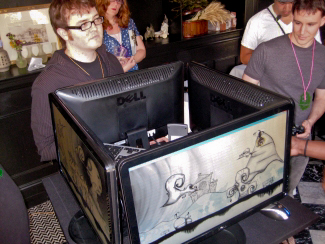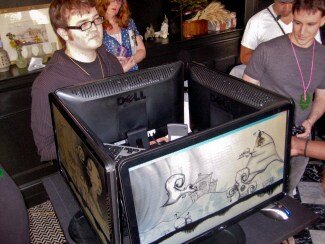 Culver City, California — “I feel like we are starting to be where we should be,” said Celia Pearce, Festival Chair of Indiecade 2009 before an intimate gathering of independent game developers, graphics artists and publishers at the The Rush restaurant in Culver City, California as the international independent games festival wrapped up Sunday, October 4th.
Culver City, California — “I feel like we are starting to be where we should be,” said Celia Pearce, Festival Chair of Indiecade 2009 before an intimate gathering of independent game developers, graphics artists and publishers at the The Rush restaurant in Culver City, California as the international independent games festival wrapped up Sunday, October 4th.
Osmos has a long list of critically favorable acclamation including top marks from IGN and IndieGames.com among others. The game can add another notch in its belt as the winner of the Indiecade award for Game of the Year. The Canadian-made ambient osmotic space shooter was developed by Hemisphere Games, led by Eddy Boxerman, who spent several years at Ubisoft working on the Splinter Cell franchise. Congratulations to the Osmos team.
Audience Choice and Finalists Votes Unanimous
This year both the main prize and the first runner up for both The People’s Choice Award and the Finalists’ Choice Awards were unanimously voted in both categories.
The first runner up went to The Deep Sleep Initiative from developer Arx (Tracy Kobedo Brown, Nicole Epps, Karin Ray, Hee Jun Kim, Brad Michael and Allison Theus), an experimental, casual alternative reality game (“ARG”) designed to lead players on a journey through a cross-media landscape.

Using a collection of fifty-one individually unique, hand-crafted journals, the game steers players to a variety of websites to paint an original world wherein every area the player uncovers brings them closer to solving the final mystery.
First place in People’s Choice and Finalists’ vote went to Minor Battle (lead designer Andre Clark, producer Drew Moxon), an innovative capture-the-flag scenario wherein team members, who can switch from tank to defender to runner on the fly, attempt to carry a bomb, like a football, in order to drop it on the opponents key targets. What makes the gameplay so interesting is that it is designed to be played on multiple screens.
To clarify: this is not an online multiplayer game per se, but rather a live multiplayer action game comprising four outward facing screens in a box configuration that display a contiguous playing field that forces the participants to move around the perimeter in order to follow their avatar and lay waste to the complete landscape.

We asked the team how they saw this positioned in the marketplace and they implied that it would be best suited for public gaming areas like cinemas or theme parks. Though effectively a prototype, anyone who could pony up for a set of four 22″ wide screen LCD’s could easily set this up at home.
The Singularity and a New Model For the Indie Game Label
At the end of the ceremony, in an interesting twist, Jesse Vigil of Psychic Bunny and Indiecade Festival Director Sam Roberts along with Celia Pearce (Festival Chair) announced a partnership venture to form The Singularity – a new independent game label.

We spoke briefly with Sam about the announcement and asked if he felt any affinity with SubPop and its model for releasing indie music in the early 1990’s.
“We plan on following the Motown label template wherein talented artists worked on a salary and participated in the revenue share but in this case would keep 100% of their intellectual property. The idea is to work almost as an A&R function, finding the most promising young developers and aligning them with [the equivalent of what would have then been] the best recording engineers and producers.”
The the bread has just gone into the proverbial oven, The Singularity plans on releasing two to four titles per year.



